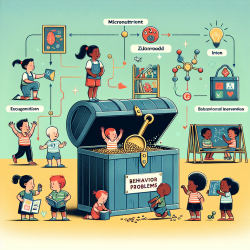As professionals in the field of special education and therapy, continuous learning and adaptation of new strategies are crucial for providing the best support to our students and clients. The realm of Augmentative and Alternative Communication (AAC) is no exception. Recent research, such as the study on Augmentative and Alternative Communication Mediator Training in Ontario, sheds light on the complexities and necessities of mediator training in AAC. This blog post aims to explore the outcomes of this research and how practitioners can improve their skills by implementing or encouraging further research on these findings.
Mediator training in AAC is a multifaceted process influenced by various factors, including the perspectives and turnover of mediators, levels of understanding of AAC, and the lack of follow-up opportunities. The study conducted in Ontario highlights the need for structured training programs that address these challenges and ensure that mediators are well-equipped to support AAC users effectively.
Here are several key takeaways from the research and how you can apply them to enhance your practice:
- Understanding the Complexity: Recognize that mediator training is not a one-size-fits-all solution. Each mediator comes with their own set of skills, experiences, and perspectives on AAC. Tailoring training to meet these diverse needs is crucial.
- Addressing Turnover: Mediator turnover is a significant challenge in maintaining consistent support for AAC users. Developing a comprehensive onboarding and training process for new mediators can mitigate the impact of turnover.
- Enhancing Understanding of AAC: A deep understanding of AAC is essential for mediators. Incorporating various training methods, such as hands-on sessions, demonstrations, and role-playing, can improve mediators' competencies in AAC.
- Facilitating Follow-up: Establishing a system for ongoing support and follow-up with mediators after initial training sessions can enhance the effectiveness of the training and provide mediators with the resources they need to address challenges as they arise.
- Encouraging Initiative: Empowering mediators to take the initiative in contacting trainers or seeking out additional resources when faced with problems can foster a more proactive approach to problem-solving in AAC mediation.
The study also underscores the importance of incorporating adult learning principles into mediator training programs. Understanding how adults learn and applying these principles can make training more effective and engaging for mediators. This includes recognizing the value of experiential learning, accommodating different learning styles, and ensuring that training is relevant and immediately applicable to the mediators' roles.
Another critical aspect highlighted by the research is the need for formal program evaluations. Regularly assessing the effectiveness of mediator training programs can provide valuable insights into areas for improvement and ensure that the training meets the needs of AAC users, their families, and mediators.
For practitioners looking to enhance their skills in AAC mediator training, this research offers a wealth of information and recommendations. By adopting a more structured and informed approach to training, practitioners can improve the support they provide to AAC users and their mediators, ultimately facilitating more effective communication and interaction.
In conclusion, the Augmentative and Alternative Communication Mediator Training in Ontario study provides essential insights into the challenges and needs of mediator training in AAC. By implementing the outcomes of this research or encouraging further investigation, practitioners can significantly enhance their skills and the quality of support provided to AAC users. For those interested in delving deeper into the research, I encourage you to read the original paper.
To read the original research paper, please follow this link: Augmentative and Alternative Communication Mediator Training in Ontario.










